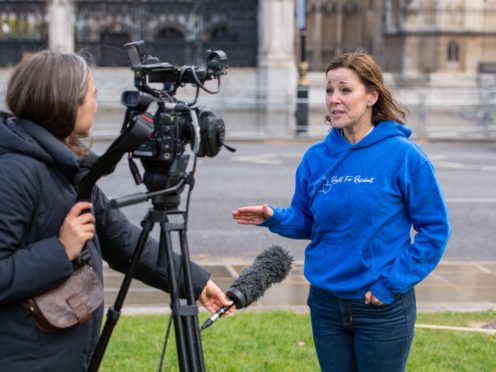Actress Ruthie Henshall has said it is still a “postcode lottery” if families can see their loved ones in care homes.
From Tuesday, residents leaving their home to go for a walk or to visit a loved one’s garden will no longer have to isolate for two weeks on their return.
The Department of Health and Social Care (DHSC) removed the requirement for outdoor, “low risk” visits after being threatened with legal action by the charity John’s Campaign.
'The light is back on in her eyes.'
Some restrictions have been lifted on care home residents today but @RuthieHenshall says this doesn't go far enough. She is asking the govt to ensure relatives can visit loved ones without restrictions, even if we go into another lockdown. pic.twitter.com/oRztbCcXcb
— Good Morning Britain (@GMB) May 4, 2021
However, West End star Henshall said this does not go far enough and relatives of care home residents should have essential caregiver status by law, which would allow them to visit their loved ones in the case of another Covid outbreak.
She will deliver a petition signed by more than 300,000 people to Westminster today.
She told ITV’s Good Morning Britain she is an essential caregiver, adding: “I get I have to do the tests, wear PPE, and then I get to go in and be with my mother any time.
“But what’s still happening is it’s a postcode lottery. And some care homes are not taking up the Government’s guidelines for fear.
“Where are the human rights of the residents of these care homes? There are people who haven’t had any meaningful contact with their loved ones for 14 months.”
Henshall said her mother has rapidly deteriorated over the last year, while she has had limited contact with her other children.
She said: “My sisters get one visit every three, four weeks, for half an hour because there are so many people wanting to come in and visit.
“That’s not meaningful behind a screen, my mother has no idea what’s going on.
“As an essential carer, I go straight into her room, I’ve had the test, there are enough things to put in place now.
“Whereas a paid carer is going into everybody’s room, they are going home to their husband, their children are coming home from school, from work.
“So in actual fact, I think I’m safer. Because I’m going straight into my mother’s room, don’t see anybody else, don’t interact with anybody else.
“And she needs touch. She can’t speak, she can’t walk. She has to be fed, her food has to be mashed up. What does she have left but touch, love?
“And we all know having been starved of human affection, human touch, for the past year, we know how important that is.
“Before lockdown, she was walking and talking. I had a phone conversation the day my father died and she was very, very aware.
“And then, four months later, we understood we had to keep them safe but she was in her room 24/7, on her own with the occasional visit from a carer, and she stopped talking.
“She can’t walk anymore. Her food has to be mashed up and her drinks have to be thickened.
“And that happened in four months, now you expect some kind of deterioration, but not like that.
“When I went to see her again, the carers, two carers and the care home manager, said, ‘Oh my goodness, the light is back on in her eyes’.”
Under the rule changes, residents on visits out must be accompanied by either a member of staff or one of their two nominated visitors, and follow social distancing throughout.
They cannot meet in groups or go indoors – except for the use of toilets – and public transport should be avoided where possible.
It is understood a resident would be able to eat outside at a restaurant or cafe with their care worker or nominated visitor if they agree this with the care home in advance.
Residents will also be able to vote in person in the upcoming local elections without having to self-isolate for 14 days afterwards.
